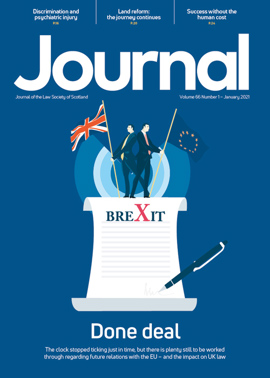The Word of Gold: Let’s raise the R rate (not that one)

Happy new year. Boy, are we happy to see the back of the old one. We’re still in the woods. The first half of this year, perhaps longer, will be tough, as social distancing continues, unemployment bites, and businesses begin repaying £200 billion of Government-underwritten debt. Yet with the arrival of three vaccines and a Brexit deal, four horsemen not of the apocalypse, but of hope and optimism can be seen peeking over the parapet. “Consider the parties you didn’t have this holiday season as merely postponed,” advises Goldman Sachs.
Markets are high. One in five Britons wants to start a business this year, rising to one in three among 18-34 year olds. The social and economic costs of the pandemic have left us all feeling battered, but compared to many other sectors, such as travel, hospitality and retail, the professions have had a pretty good war. Though their natural instinct is always to be cautious, the growth opportunities as society is liberated are clear.
So too is the opportunity to make permanent improvements to our working lives. It’s realistic to hope that offices will once again hum with activity. But embracing a mix of home and office working will be a boon to firms and individuals. The compulsory drudgery of the five (or six, or seven) day commute has gone for good. That mythical creature, work-life balance, may actually be glimpsed. With location less important, firms out of the major cities, who often have difficulty recruiting, may now have access to quality people who would not normally consider them. Conversely, living in a rural or semi-rural location while working for a city centre firm is now entirely plausible. There are reasons to be cheerful, but still, as Donald Rumsfeld famously put it, “known knowns, known unknowns and unknown unknowns” lurk in the undergrowth.
Resilience reimagined
We’ve heard a lot about “R”, the number that tells us whether COVID is receding, or as now, galloping ahead. There is another “R” of equal importance: resilience. How prepared are we to cope with and quickly recover from shocks? Last March, at a national level, the answer was, “we’re not”. Many thousands of our fellow citizens have died as a result. We continue to suffer. Sir John Bell, regius professor of medicine at Oxford, was instrumental in forging the partnership between the university and AstraZeneca to develop a British vaccine. He has made clear his frustration that years of neglect by successive governments have left the country without the means to manufacture the vaccine at the necessary pace.
It is not just government that has been neglectful. COVID has compelled businesses of every kind to redefine what it means to be resilient. Law firms have shown great agility, but often they have started from a low base. It matters that the lessons of COVID are not forgotten as things loosen up.
Perhaps the most important is that the enemy of resilience is a focus on short term equity partner returns. Resilient businesses are willing to make necessary sacrifices today for the sake of sustained performance in the future. Premises and technology infrastructure, people development, effective sales, marketing and finance functions: these are all costly, but investing in them is non-negotiable if a firm is serious about long term success.
Time for questions
So too is having enough cash in the business. A surprising number of firms still think it’s fine to borrow to pay tax, VAT and PI, as long as partner drawings are protected. Others are not so profligate, but still have drawings policies that leave them dangerously exposed to sudden changes in the wind. Every business should have a contingency fund of no less than four months’ cash cover (six months’ is better), and in all circumstances, a reliable cash flow projection which enables intelligent decision making. If a firm cannot build that level of reserve over a reasonable period of time, fundamental questions need to be asked about how it is run, and whether it has a future.
COVID has been ghastly, but it has at least created a climate where it is legitimate to question everything about the way a firm operates, and make changes. Leaders will never have a greater opportunity, nor a greater imperative, to reappraise strategy, and put every aspect of their firms’ performance under the microscope. Resilient leaders cultivate optimism in themselves and their people, not in a Pollyanna-ish way, but with a mindset that says, we can get through this, and go on to greater things, if we are thoughtful, nimble, unafraid to look the hard questions in the face, and take decisive action. As Goldman Sachs (and Shirley Bassey) attest, it’s time to get the party started.
Regulars
Perspectives
Features
Briefings
- Civil court: Who has the final word?
- Licensing: More change to come in 2021
- Planning: new route to vary an agreement
- Insolvency: Securing creditor confidence in pre-packs
- Tax: OTS on CGT – the right fixes?
- Immigration: False economy
- Scottish Solicitors' Discipline Tribunal
- Property: Scotland’s cities: is the landscape changing?
- Four to the fore: ILC’s new faces






